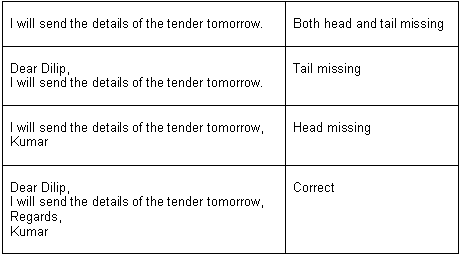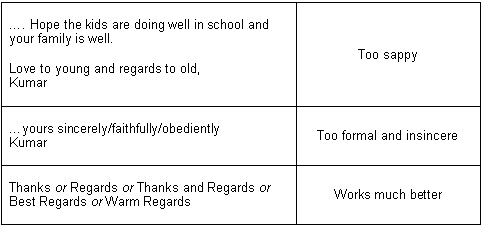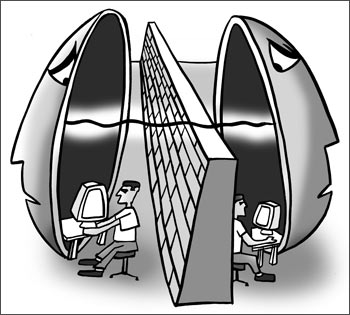Anupama Thakur, Bodhisutra
The way your e-mails look and read is one of the major indicators of your professional depth and credibility. A lot of us do significant damage to ourselves by taking e-mail-writing lightly.
Remember the following pointers while composing your professional e-mails.
Rule 1: Do not skip the head or tail of the e-mail
Salutation, body and sign-off are three principal parts of the e-mail message. Be absolutely sure not to miss any of them unless you are writing to a college friend in a casual setting.

Anupama Thakur is an NIT Hamirpur alumna and is the Director, Operations at BodhiSutra. BodhiSutra (www.BodhiSutra.com) is an IIT-IIM alumni venture which specialises in employability skills training including Job English, Professional Impact and domain specific employability skills training programmes for students and working professionals.
Illustrations: Uttam Ghosh
-Rule 2: Use simple and direct salutation; the same for sign-off
Dear Dilip, Hi Dilip, Dear Mr Kumar are proper professional salutations.
Do not get carried away while showing respect and do not borrow from letter-writing assignments you did in class VIII.
"Respected Sir" is way too deferential and so is "Honorable Mr Kumar".
While signing off too, keep things simple.

Rule 3: Use smart subject lines
Ideally, the purpose of your message should be clear in the subject line itself. Use as much information in the subject line as possible.
Leaving out the subject field is highly unprofessional and so is using something meaningless like 'Hello', etc.

Rule 4: Avoid 'bureaucratic' sentences
Professional or business English is different from the bureaucratic English typically used in government offices. Using unnecessary long-winded sentences just makes the message difficult to understand.

Rule 5: Use as few words as necessary
Long e-mails take longer to read and tell the reader you are not a very efficient writer. Any word or group of words which can be shortened should be shortened.
Professional communication should be sharp, unnecessary words have the potential of confusing the reader. Brevity is the soul of wit. It indeed is the soul of good professional writing.

Rule 6: Answer e-mails the same day
Delay in responding to e-mails gives out an impression of carelessness and unprofessionalism and also, that responding to that particular person is not high on your priority list.
A very useful rule of thumb is to read the e-mails the same working day and any e-mail that you receive during the day should be replied to before the end of the working day, even if it means sending back a short note saying that you will get back to him/her soon with a detailed response.
Rule 7: Be careful with attachments
In these days of spam and Trojans and viruses, attachments are risky business. Try to have a 'no attachment' policy unless the person is expecting one or an attachment needs to be sent.
Need is the key, if an attachment is not required, skip it.
Several spam filters summarily send the mails with attachments to junk and that's another reason to use attachments sparingly.
Rule 8: Avoid using excessive capitals
Capitalisation of unnecessary words amounts to shouting in the cyber world. Use capital letters only to begin sentences and for names -- exactly as they taught you in school grammar. Using capitalisation to stress or emphasise a point is often considered rude and aggressive.
Rule 9: Be careful with 'reply all' and forwards
If the message does not need to be read by all in the mailing list, do not 'reply all'. These days everyone receives so much junk mail that adding an extra irrelevant email to them reduces your credibility and is bad manners.
Similarly, do not forward chain letters or hoaxes or, 'Send it to 25 people within 15 minutes else your cat will die' email.
Rule 10: Avoid SMS language
SMS language is only for SMSes. Use proper English sentences and words while writing emails.
"Gr8 2 hear frm u" may be a nice way to greet a friend on SMS or orkut/facebook, but it can kill the professionalism of your e-mail. Avoid it.
If clothes make a man, then e-mails make a professional. Use it smartly as a tool to create a powerful professional impact.



Comment
article